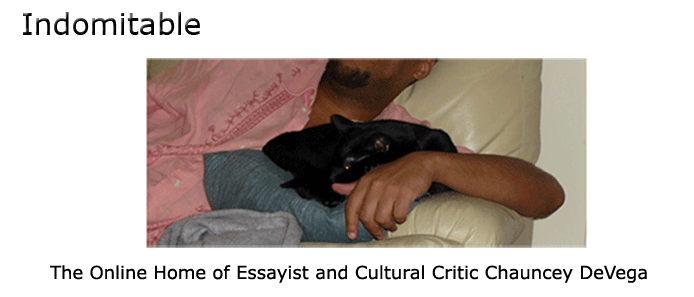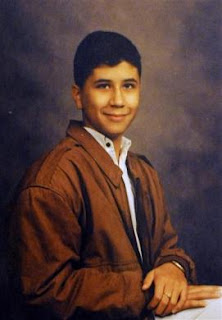Blackness comes with no expectations of safety, care, or security.
Mediated realities. The pictures inside of people's heads. Life worlds. Bonding social capital. Lifestyle enclaves. The Big Sort. Red State and Blue State America. The color line. Residential housing segregation. Dense and exclusive social networks. The purpling of America.
Social scientists have developed an extensive vocabulary in order to discuss how people live in their own bubbles, and are exposed to a very narrow slice of the broader world. In matters of politics, and the Common Good, this means that what should be clear, commonly understood, and shared priors are often anything but--instead, they are made contingent, circumstantial, and open to debate and evaluation.
These gaps in experience can result in humorous, albeit very revealing, gaffs: Mitt Romney's joke about a 10,000 bet or his suggestion that young people can easily borrow 20,000 dollars from their parents and start a business. Romney had no malignant intent here--he simply does not have any friends who are poor, working class, or even barely middle class. His life world, despite his vast wealth, is limited, by choice, to those like him.
In discussions of race and racial inequality a similar dynamic also holds. While American popular culture is dependent on a type of insincere and false multiculturalism and diversity (black and brown bodies are present, but the lives behind them are often flattened and caricaturized; the white gaze still operates in the popular imagination), day to day life and society remain extremely segregated. For some, this is a result of "Whitopian" dreaming and deliberate action where the good life is defined precisely by one's ability to avoid people of color.
For others, segregation and racially homogeneous friendship and social networks are either 1) just a matter of life because race and class are intimately related to each other in America or 2) the result of a type of rational ignorance where many white folks are happy and secure knowing that they can live a quite normal and productive life (one that is guilt free) in which they will not have to encounter people of color as their bosses, neighbors, teachers, confidantes, or friends--unless they so choose.
Consequently, there are profound divergences in first principles. By implication, it is difficult to find consensus on any number of public policy issues or matters of public concern (see the huge divides in public opinion by race regarding the Trayvon Martin killing).
For example, according to public opinion surveys a significant majority of whites believe that America is a meritocracy, racism is a thing of the past, black people have an equal chance at success in the United States if "they just work hard," black children and white children have the same life chances in America, and the goals of the civil rights movement have been attained.
In addition, 80 or so percent of white respondents say that they have a close friend who is a person of color. If one does even some cursory math, this would suggest that blacks for example have at least 3 close white friends in their social network. Perhaps most absurdly, a significant percentage of respondents in a recent survey believe that racism "against" white people is a bigger problem than discrimination against racial minorities.
Given all of the overwhelming and readily available evidence to the contrary for how race over-determines life chances (and the advantages of Whiteness), this data suggests that a majority (more than 50 percent) of the white American public is in the midst of a type of mass delusion, denial, and psychosis.
In all, because shared experience(s) is/are bisected by the color line, what remains is a veil of ignorance. Thus, the existence of racism, and deep veins of white supremacy in America, are reduced to an "opinion" as opposed to one of the most documented and well-researched facts in contemporary social science. Racism is real. It is not something that people of color imagine and make up for their own narrow and personal "gain."
We are not crazy when we say that racism is killing us. We are not delusional or insane when we say that race still matters. Three recent news items help to remind us that reality is biased in the favor of our standing hypothesis that racism is real, even in post-racial Age of Obama America.
An elite unit of the New York Police Department is being investigated for operating under a standing order where its officers were instructed to shoot black people in the head like "animals"--for dead men tell no tales.
More benign, but no less problematic in its implications, the Russel Sage foundation has released a compendium of research on the relationship between race and class in America. Some of their findings include:
- Stereotypes are pervasively used in cross-class encounters. Brain imaging scans show that rich people are often seen as competent but cold and untrustworthy, according to studies from psychologist Susan Fiske. By contrast, poor people are viewed as lacking both warmth and competence, and are often blamed for their poverty. In one study, Princeton students reported their reactions to a peer who was described alternately as rich or poor, and lazy or hardworking. Respondents gave strongly negative reactions to both the lazy and hardworking poor peer; by contrast, the work ethic of the affluent peer did not polarize ratings.
- Your social class may influence how you are racially identified. Individuals are less likely to be identified as white and more likely to be identified as black if they have ever experienced markers of low socioeconomic status such as incarceration or unemployment, according to psychologists Diana T. Sanchez and Julia A. Garcia.
Recently, the W.K. Kellog Foundation's Healing for Democracy conference brought together some of the leading scholars and researchers on social inequality and public policy. Apparently, the collective subconscious of American society remains sick with the disease of racism:
Hinojosa said it is “irrefutable” what is happening in America today. “We are clearly becoming a more multicultural, multiracial, mixed country. That is the future.” But she noted that the changing demographics are causing tension and fear among the majority. “There’s an element of unconsciousness there,” she said, “but there’s also an element of consciousness which is saying – at this moment I’m in the world of being a non-Hispanic Anglo…I don’t want to become a minority.”
One panelist, Dr. David Williams, professor of African and African American Studies at Harvard University, cited studies documenting that when Latinos and African Americans were treated by physicians for a broken bone in their leg, they received pain medication significantly less often than white patients with the same injury
“How on earth do we make sense of this?” Dr. Williams asked. “How is it possible that for the best trained medical workforce in the world to produce… care that appears to be so discriminatory? The answer: unconscious discrimination. Research shows that when one holds a negative stereotype about a group and meets someone from that group, without their conscious awareness, it is an unconscious process and it is automatic. They will treat that person differently and honestly not know that they did it...”
Dr. Gail Christopher, vice president for program strategy at the Kellogg Foundation, explained that centuries of a racial hierarchy in America has left its mark on our society, especially pertaining to how people of color are perceived by whites. “Our society assigns value to groups of people,” she said. “It is a process that is embedded in the consciousness of Americans and impacted by centuries of bias.”
During the discussion today, panelists shared insights demonstrating how people make unconscious decisions. Dr. Phillip Goff, assistant psychology professor at UCLA, showed examples of how law enforcement officials can be motivated by unconscious bias not only to race, but also to what they perceive as threats to their masculinity.
The people that are supposed to protect us are in fact killing us. The caregivers who should do no harm and take care of us when we are sick are instead leaving us to suffer. These facts ought not to be surprising.
Nevertheless, they are no less damning.
Ultimately, I don't blame white folks for practicing rational ignorance about the grotesque realities of white supremacy in post-civil rights America. If by birthright and color, I could choose to ignore such matters I would too. Such a choice is unethical. However, I would be saved much mental energy. God and fate have not allowed me such a privilege and luxury. I would not want it any other way.
Nevertheless, they are no less damning.
Ultimately, I don't blame white folks for practicing rational ignorance about the grotesque realities of white supremacy in post-civil rights America. If by birthright and color, I could choose to ignore such matters I would too. Such a choice is unethical. However, I would be saved much mental energy. God and fate have not allowed me such a privilege and luxury. I would not want it any other way.





